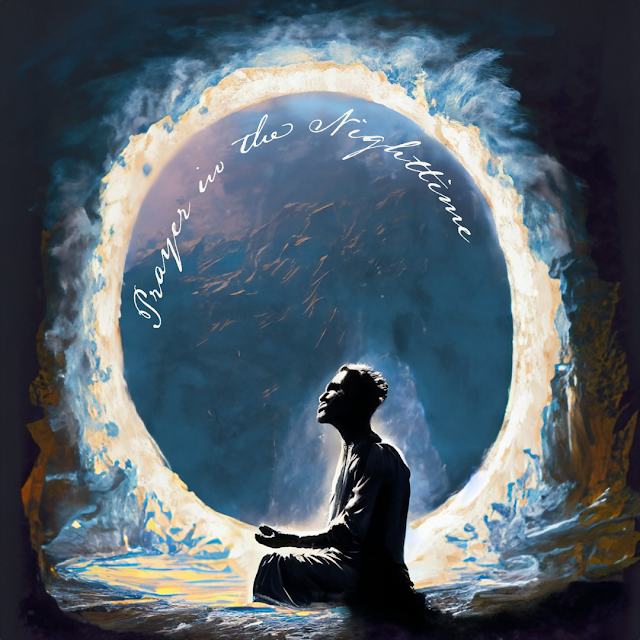New Music: Prayer in the Nighttime
This is the second original song I've written since starting back up that part of my life over a year ago. Even though I recently published the first one, I've been working on this one passively for months, and actively for weeks. I'm not trying to start a career or a following as a musician, but music is just something I've always done. I figure it's time I preserve it, and there are those who assure me that at least some other people will like my music, so I guess it won't hurt to share.
Anyway, rather than being a revamped version of a song I wrote as a teenager, this is a totally new one, although the influences that inspired it do reach all the way back to my childhood. The story is below, but you can listen to the song and download the sheet music here.
Growing up in Utah in the 90s, I heard a lot of Afterglow songs. One of them, “A New Heart,” stuck with me. I liked how the singer in that song expresses his struggle to feel the change in his heart as he tries to become converted to Christ, and I wanted to write a song on a similar theme.
Fast forward to the fall of 2022. I’ve barely written any music for the past 20 years, though I’ve started reworking an old song of mine at my brother’s request. One night, I’m studying the Old Testament with my family, when I read this passage from Psalm 51:
Create in me a clean heart, O God; and renew a right spirit within me. Cast me not away from thy presence; and take not thy holy spirit from me. Restore unto me the joy of thy salvation; and uphold me with thy free spirit.
It’s David pleading with the Lord to forgive him after going in to Bathsheba, and it practically sings itself to me. I feel the words of this and other psalms swirling together with my Afterglow influence and the chorus just pops, fully formed, into my head:
Create in me a new heart. O God above, forgive me. Teach me the way to live. Be my tower and my refuge from mine enemy.
The notes won’t stop repeating themselves. I’m afraid I’ll forget, so as soon as possible I open Garage Band and plunk it out. Awkwardly, since I don’t play piano. But eventually I figure it out.
I think about it all night. The next morning I’m singing it to myself on my commute, looking for more. At some point I get the second chorus, though I don’t know it as such at the time. I spend several more commutes singing through it in the car, my teenage daughter asleep (hopefully) in the back seat, as I search for a connective thread or anything that feels right, but nothing comes. I don’t know what the rest of this song needs to be.
Fast forward again to around May or June of 2023. I haven’t forgotten this song, and now I feel like I have time to finally work on it. So I do, and the rest of it comes readily. I start with figuring out the order of the two choruses I have. I write some verses. I realize the accompaniment shouldn’t be a piano, but a harp. I don’t know how to write for a harp, so I enlist the help of my sister-in-law, who plays that beautiful instrument. The lyrics go through revision after revision. I decide it needs a violin. I ask my poor wife to listen to endless variations of it. I share it with my brother, whose inspiring music is what got me going on songwriting again in the first place. It takes a number of weeks, but eventually it gets to where it is now:
This song tells the story of a person sincerely turning to the Lord in prayer for the first time in a while. I imagine
a dark room in the middle of the night. Everyone else in the house is asleep, but our singer’s heart is in agony,
and he can’t rest. The violin is the spirit of the Lord, prompting our protagonist to pray. The harp is his emotional resonance with the spirit: his heart’s song. It’s halting at first, and thin. Once he gets going, the spirit just listens. He confesses his unworthiness and humbles himself with awkward but sincere words of faith. He pleads for forgiveness.
As he prays, his heart resonates more fully with the spirit, and starts to change. He shifts from abject apology
and finds a desire to align his will with God’s. He wants to be led now, rather than to lead. He no longer needs to approve of or even see the destination. He trusts God to lead him aright. Throughout this, the spirit propels him, approves his words, and gives him more. As he responds to the spirit, the spirit responds in kind. And then it’s the supplicant’s turn to simply listen. The spirit takes over as the voice falls silent, speaking to him without words, straight to his heart.
Finally, the voice comes back in. Quiet. Humble. Grateful. Clean. Our supplicant now seeks only one blessing: the continued presence of the Lord. With the message received—the heart changed—the prayer ends.


Comments